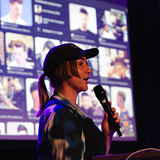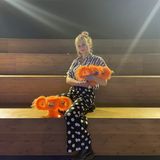Deepfakes like a Taylor Swift clip urging voters to support Donald Trump, political parties using AI to draft election programs, and algorithms controlling our news – AI is no longer a question of if but how far it will change democracy. Disinformation spreads faster than ever, raising doubts about whether elections can still be free and fair. Can AI be used to manipulate public opinion, making it impossible to trust what we see and hear? Or could it be harnessed to strengthen democracy—by educating citizens, enabling dialogue, and helping politicians understand their citizens? On January 29th 2025, DE/MO invites you to Pakhuis de Zwijger for a special night filled with inspiration, discussion and artistic performances while we reflect on AI’s role in shaping the future of democracies.
*Rudy van Belkom is participating online.






Speakers
Payal Arora is a Professor of Inclusive AI Cultures at Utrecht University and co-founder of FemLab, a feminist futures of work lab, and the Inclusive AI Lab, a Global South debiasing data initiative. She is a leading digital anthropologist with two decades of user experiences in the Global South to help shape inclusive AI enabled designs and policies. Payal is the author of 100+ journal articles and award-winning books including “The Next Billion Users” with Harvard Press. Forbes named her the ‘next billion champion’ and the ‘right kind of person to reform tech.’
Rudy van Belkom is the director of the Stichting Toekomstbeeld der Techniek (STT). He advocates for technology that takes the imperfections of human nature into account. In his book Alive and Clicking, he explains why, despite an era of filter bubbles, fake news, and polarization, there is still hope for democracy.
AI Pubquiz by: Nastia Cistakova & Roos Groothuizen
Roos Groothuizen is a media artist advocating for digital human rights. In her own practice and as part of the art collective Telemagic, she explores the human side of invisible algorithms, information filters, and unfair distribution systems. Among her projects is I Want to Delete It All, But Not Now, an escape room about the power of Big Tech… from which you cannot escape. She is also the founder of .zip in Rotterdam, an artistic workspace for digital culture and alternative art forms.
Nastia Cistakova is an artist and illustrator whose socially critical work is steeped in misery and absurdity. She has previously created a video game about a potato experiencing a quarter-life crisis, paintings about romantic spam emails, video art about real fake animals, and numerous illustrations for publications such as De Correspondent and De Volkskrant. Her first illustrated children’s book, Soctopus, created in collaboration with author Jowi Schmitz, was published by Volt.
Marieke Koekkoek
Marieke Koekkoek is a Dutch member of parliament and a member of the pan-European political party Volt. Motivated by a strong sense of justice, she is committed to fostering a green future through sustainable choices. She is passionate about making our digital society both safe and open to exploration, addressing important issues such as AI, social media, fake news, and algorithms. In her work, Marieke remains steadfast in upholding democratic values, justice, human rights, and equity
Kees Verhoeven
Kees Verhoeven is a tech expert, owner of Bureau Digitale Zaken, former Member of Parliament for D66 (2010–2021), and former director of the SME sector. He put digital technology on the political agenda and was named IT Politician of the Year twice. As an entrepreneur, he now advises governments, industries, and businesses on digital transformation. In 2023, he published his book “De Democratie Crasht”, which reveals how digitalization is changing decision-making processes and what is needed to regain control over technology.









